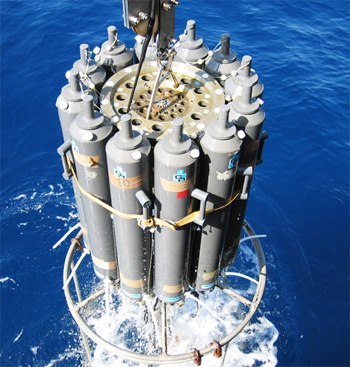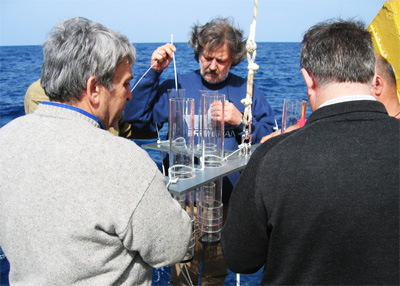In 2002 HCMR President George Chronis signed a memorandum of understanding with Robert L. Carothers, President of Rhodes Island University, thus paving the way for the first joint oceanographic study to take place.
The project, part of a National Science Foundation funded study entitled FACTS (Fluxes in the Aegean of Carbon and Thorium Study), also includes research in the Arctic and Atlantic oceans. Participants, Dr E.Papathanassiou and URI Professor S. Bradley Moran, led a team of scientists on a research cruise on the RV AEGAEO, studying carbon fluxes in the South Aegean Sea with the goal of producing a comparative study of the sinking rate of particulate organic carbon using sediment trap and radioisotopic methods.
The scientific team is experimenting with new and existing measurements of Thorium-234 combined with organic carbon and specific organic compounds in the upper ocean to test models of carbon export, given the chemical, physical and biological differences that exist in different parts of the world ocean.
"The FACTS project was initiated when Evangelos Papathanassiou, director of oceanography at the Helenic Centre, invited Moran to present his research ideas in September 2003. A second research cruise is being planned for . . . 2005, and the Greek scientists will also sail with Moran’s group aboard the URI research vessel Endeavor in 2005 between Narragansett and Bermuda," reports Lisa Cugini of URI's Pacer publication.
“Following the success of this first expedition and the overall planning, we can certainly say that this initiative provides greater possibility of joint research between the two institutions in the future,” said Papathanassiou. “We feel that this collaboration has much more to offer both of us working together for a common cause.”
“This project gives new life to the collaborative agreement signed in 2002 and holds great promise for further joint expeditions in the future. We are grateful to Dr. Moran for his leadership,” said URI President Carothers in a press statement.
A second research cruise is being planned for 2005, and on this occasion the Greek scientists will sail with Moran’s group aboard the URI research vessel Endeavor in 2005 between Narragansett and Bermuda.
“This research has an important bearing on a number of national and international carbon cycle research programs,” said Moran in an interview with Pacer.
This collaboration between the two institutions is already moving beyond the FACTS (carbon flux) project. Professor Moran has joined a multinational European Union project (IASON) which will establish transnational and multidisciplinary cooperation networks to treat and protect the Mediterranean and Black Sea maritime basins, culminating in the production of a marine and coastal scientific policy plan for the region.
The Hellenic Centre for Marine Research (HCMR) was set up as a single institution in order to integrate government-funded marine science research in Greece. Formally established by government decree on June 3 2003, it combines the former research institutes NCMR and IMBC, together with their respective field stations.The Centre has five institutes, which carry out research into specific thematic areas: Institute of Oceanography; Institute of Aquaculture; Institute of Marine Biological Resources; Institute of Inland Waters; Institute of Marine Biology and Genetics. HCMR enjoys top-level scientific support from its two research vessels, the RV AEGAOU and RV PHILIA, its state-of-the-art 2-man submersible THETIS as well as two deepwater ROVs, named the MAX ROVER and the SUPER ACHILLES. THe Centre is also responsible for the Rhodes Aquarium and the Aquarium in Crete now under construction. For more information about the Centre, visit its website at http://www.hcmr.gr/



